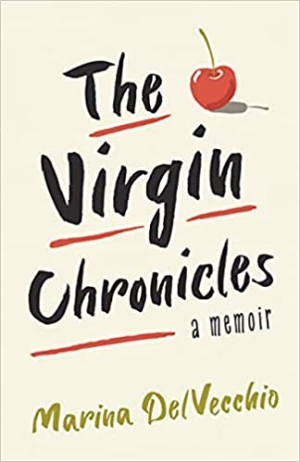The Virgin Chronicles
A Memoir
A twist on liberated feminism, the memoir The Virgin Chronicles models romantic fortitude.
Marina DelVecchio’s pointed memoir The Virgin Chronicles follows her adamant quest for a love that warrants sex.
DelVecchio was born in Greece. Placed in an orphanage when her mother, who worked as a prostitute, could no longer care for her, she was adopted by a Ann, who was also Greek but from New York, when she was eight. Despite DelVecchio’s exemplary grades, work ethic, and tight-knit group of girlfriends, Ann accused her of doing drugs and having sex.
In an effort to prove her innocence and independence, after one semester of college, DelVecchio paid her own rent and tuition. Still, Ann subjected her to nightly inspections upon her arrival home. DelVecchio worked two jobs, attended school, and enjoyed dancing at clubs with friends. She kissed many boys, but did not have sex until, at twenty-four, she met a man who reached her standards.
Like DelVecchio’s determined protection of her virginity, the text is focused. Each chapter’s title and first sentence pronounce a theme that is adhered to throughout. There’s word play involved: “How to Whoreify A Virgin” and “Knights and Virgins” both introduce levity among the otherwise serious text. And the repetition of “virgin” reiterates the book’s purpose: to break down taboos about virginity, and too open it as a subject of inquiry, as opposed to a put-down. However, the book’s contrasts between prostitution and whoredom are underdeveloped elements.
Measured and careful, the book’s arc follows a clear trajectory toward fulfilling sex. Along the way, those whom DelVecchio encounters are developed with affection: her friends, and some boys, help her to break down the walls and protective barriers that she put up. They loosen her up on the dance floor, and support her when she’s drunk. They listen to her complaints about her mother. Boyfriends show her how to give and take pleasure, too.
But the book’s conversations stick too close to the topic of virginity to help flesh the other people in the story out; recalled exchanges with others center on DelVecchio’s singular concerns, and become a repetitive device. Still, they reflect easy rapport—except at home, where DelVecchio’s discussions with Ann are as icy as the atmosphere. They help to move the book toward its satisfying, love-focused ending, which also represents a new beginning.
A twist on liberated feminism, the memoir The Virgin Chronicles models fortitude and champions adhering to one’s ideals to elicit change.
Reviewed by
Mari Carlson
Disclosure: This article is not an endorsement, but a review. The publisher of this book provided free copies of the book and paid a small fee to have their book reviewed by a professional reviewer. Foreword Reviews and Clarion Reviews make no guarantee that the publisher will receive a positive review. Foreword Magazine, Inc. is disclosing this in accordance with the Federal Trade Commission’s 16 CFR, Part 255.

